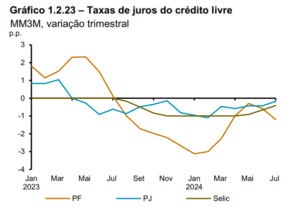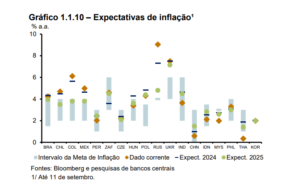
Brazil’s monetary policies are strategies adopted by the Central Bank of Brazil (BC) to control the money supply and pursue the country’s inflation target.

Brazil’s monetary policies are strategies adopted by the Central Bank of Brazil (BC) to control the money supply and pursue the country’s inflation target. According to the Central Bank itself, price stability preserves the value of money by maintaining the purchasing power of the currency.
As Brazil is one of the largest global producers and exporters of commodities, monetary decisions have a direct impact on the competitiveness of Brazilian products on the international market. That’s why we invited Hedgepoint’s Energy and Macroeconomics analyst, Victor Arduin, to discuss this influence and its role in the Brazilian economy. Read on and enjoy!
 Monetary policies, as Arduin explains, have the main objective of controlling inflation or, in some special cases, deflation. “The latter indicates a lack of consumption in the economy, which can lead to a recessionary scenario, with a loss of jobs and income,” adds Victor
Monetary policies, as Arduin explains, have the main objective of controlling inflation or, in some special cases, deflation. “The latter indicates a lack of consumption in the economy, which can lead to a recessionary scenario, with a loss of jobs and income,” adds Victor
In Brazil, monetary policies are traditionally focused on reducing inflation. According to Hedgepoint’s Energy and Macroeconomics analyst, this is a common characteristic among emerging countries.
This is why the profile of monetary actions in Brazil is usually more restrictive. In this case, the Central Bank raises interest rates, making credit more expensive and reducing consumption and investment. This helps to reduce the amount of money in circulation and control inflation.
Read also:
“Furthermore, when Brazil raises interest rates, it creates an attractive differential in relation to foreign economies, encouraging an influx of dollars into the country. This influx of capital helps to appreciate the exchange rate, but can harm the competitiveness of our commodities,” adds Arduin.
The professional also explains that the effect is reversed in the case of more expansive monetary policies, used to stimulate the economy in times of recession or slow growth. In this scenario, the Central Bank reduces interest rates to facilitate credit and stimulate consumption. With more money circulating, demand for products and services tends to grow, stimulating the economy.
“This measure could lead to a depreciation of the Real and an increase in inflation. However, this tends to make Brazilian commodities more competitive on the global market, encouraging product exports,” concludes the expert.
Read also:
Currently, Brazil’s monetary policies remain more restrictive. The basic interest rate, Selic, was recently increased and remains high compared to other economies.
“This affects the cost of borrowing for the commodities and agribusiness sector, even though there are subsidized credit lines for certain segments. These incentives allow producers to expand their investments at lower interest rates, but they can create distortions in the cost for other sectors,” says Arduin.
Currently, the Selic rate is 11.25% per year, a figure set by the Central Bank’s Monetary Policy Committee (Copom). In September 2024, the institution also published a retrospective of the Selic rate since January 2023. See below:

Source: Central Bank of Brazil
With regard to inflation, the Central Bank’s data reiterates the position of the Hedgepoint expert. Compared to other economies, Latin American countries have higher inflation rates and tighter monetary policies. Brazil maintains inflation within the target range, but at the upper limit. Expectations for 2025 remain at the same levels. See:

Source: Central Bank of Brazil
Victor Arduin also points out that Brazil’s growing public debt poses risks for the national economy. According to the expert, high debt levels put pressure on the currency and can reduce investor confidence.
“The country’s economic situation deserves a ‘yellow light’, especially given the impact that the increase in debt could have on investors,” adds the analyst.
Read also:
Brazil’s history with currency instability is not recent. In the 1980s and 1990s, the Latin American country faced inflation rates that reached 2,500% a year. This economic downturn began in 1979 with the second international oil crisis. In 1994, the country managed to implement the Real Plan, equalizing the purchasing power of the Brazilian currency with the US dollar at the time.
“The Real Plan was a response to the inertial inflation Brazil was experiencing. To contain the loss of purchasing power, it was necessary to create a new currency that would generate confidence and stabilize inflation, combined with fiscal adjustments to balance public accounts,” adds Victor.
Currently, Brazilian inflation is more contained, but it is still more volatile when compared to more competitive currencies, such as the Euro and the Dollar. In 2023, Brazil’s inflation reached 4.6%, a relatively high figure, but still within the National Monetary Council’s target
The Hedgepoint expert points out that “maintaining a balance in monetary policies is essential. An excessively depreciated currency can generate inflation, and this affects the cost of living in the country, even if it brings gains in competitiveness for exporters.”
Read also:
Victor Arduin points out that hedging can help mitigate the impacts of Brazil’s monetary policies, especially in contexts of high exchange rate and commodity price volatility. According to the expert, “hedging tools become a financial layer of protection for producers and exporters”.
A monetary policy that strengthens the Real, for example, could have a negative impact on the revenue of companies that work with commodities. Hedging allows these companies to lock in a minimum price for their future sales, guaranteeing a pre-agreed financial return, even if the Real’s purchasing power changes.
Contact Hedgepoint and learn more about FX hedging from one of our experts.

Rua Funchal, 418, 18º andar - Vila Olímpia São Paulo, SP, Brasil
Contato
(00) 99999-8888 example@mail.com
Section
Home
O que Fazemos
Mercado
Quem Somos
HUB
Blog
Esta página foi preparada pela Hedgepoint Schweiz AG e suas afiliadas (“Hedgepoint”) exclusivamente para fins informativos e instrutivos, sem o objetivo de estabelecer obrigações ou compromissos com terceiros, nem de promover uma oferta ou solicitação de oferta de venda ou compra de quaisquer valores mobiliários, commodity interests ou produtos de investimento.
A Hedgepoint e suas associadas renunciam expressamente a qualquer uso das informações contidas neste documento que direta ou indiretamente resulte em danos ou prejuízos de qualquer natureza. As informações são obtidas de fontes que acreditamos serem confiáveis, mas não garantimos a atualidade ou precisão dessas informações.
O trading de commodity interests, como futuros, opções e swaps, envolve um risco substancial de perda e pode não ser adequado para todos os investidores. Você deve considerar cuidadosamente se esse tipo de negociação é adequado para você, levando em conta sua situação financeira. O desempenho passado não é necessariamente indicativo de resultados futuros. Os clientes devem confiar em seu próprio julgamento independente e/ou consultores antes de realizar qualquer transação.
A Hedgepoint não fornece consultoria jurídica, tributária ou contábil, sendo de sua responsabilidade buscar essas orientações separadamente.
A Hedgepoint Schweiz AG está organizada, constituída e existente sob as leis da Suíça, é afiliada à ARIF, a Associação Romande des Intermédiaires Financiers, que é uma Organização de Autorregulação autorizada pela FINMA. A Hedgepoint Commodities LLC está organizada, constituída e existente sob as leis dos Estados Unidos, sendo autorizada e regulada pela Commodity Futures Trading Commission (CFTC) e é membro da National Futures Association (NFA), atuando como Introducing Broker e Commodity Trading Advisor. A Hedgepoint Global Markets Limited é regulada pela Dubai Financial Services Authority. O conteúdo é direcionado a Clientes Profissionais e não a Clientes de Varejo. A Hedgepoint Global Markets PTE. Ltd está organizada, constituída e existente sob as leis de Singapura, isenta de obter uma licença de serviços financeiros conforme o Segundo Anexo do Securities and Futures (Licensing and Conduct of Business) Act, pela Monetary Authority of Singapore (MAS). A Hedgepoint Global Markets DTVM Ltda. é autorizada e regulada no Brasil pelo Banco Central do Brasil (BCB) e pela Comissão de Valores Mobiliários (CVM). A Hedgepoint Serviços Ltda. está organizada, constituída e existente sob as leis do Brasil. A Hedgepoint Global Markets S.A. está organizada, constituída e existente sob as leis do Uruguai.
Em caso de dúvidas não resolvidas no primeiro contato com o atendimento ao cliente (client.services@hedgepointglobal.com), entre em contato com o canal de ouvidoria interna (ombudsman@hedgepointglobal.com – global ou ouvidoria@hedgepointglobal.com – apenas Brasil) ou ligue para 0800-8788408 (apenas Brasil).
Integridade, ética e transparência são valores que guiam nossa cultura. Para fortalecer ainda mais nossas práticas, a Hedgepoint possui um canal de denúncias para colaboradores e terceiros via e-mail ethicline@hedgepointglobal.com ou pelo formulário Ethic Line – Hedgepoint Global Markets.
Nota de segurança: Todos os contatos com clientes e parceiros são realizados exclusivamente por meio do nosso domínio @hedgepointglobal.com. Não aceite informações, boletos, extratos ou solicitações de outros domínios e preste atenção especial a variações em letras ou grafias, pois podem indicar uma situação fraudulenta.
“Hedgepoint” e o logotipo “Hedgepoint” são marcas de uso exclusivo da Hedgepoint e/ou de suas afiliadas. O uso ou reprodução é proibido, a menos que expressamente autorizado pela HedgePoint.
Além disso, o uso de outras marcas neste documento foi autorizado apenas para fins de identificação. Isso, portanto, não implica quaisquer direitos da HedgePoint sobre essas marcas ou implica endosso, associação ou aprovação pelos proprietários dessas marcas com a Hedgepoint ou suas afiliadas.
aA Hedgepoint Global Markets é correspondente cambial do Ebury Banco de Câmbio, de acordo com a resolução CMN Nº 4.935, DE 29 DE JULHO DE 2021, Artigo 14 do Banco Central do Brasil (BACEN).
Para mais informações sobre nosso parceiro, serviços disponíveis, atendimento e ouvidoria, acesse o link a seguir: https://br.ebury.com/